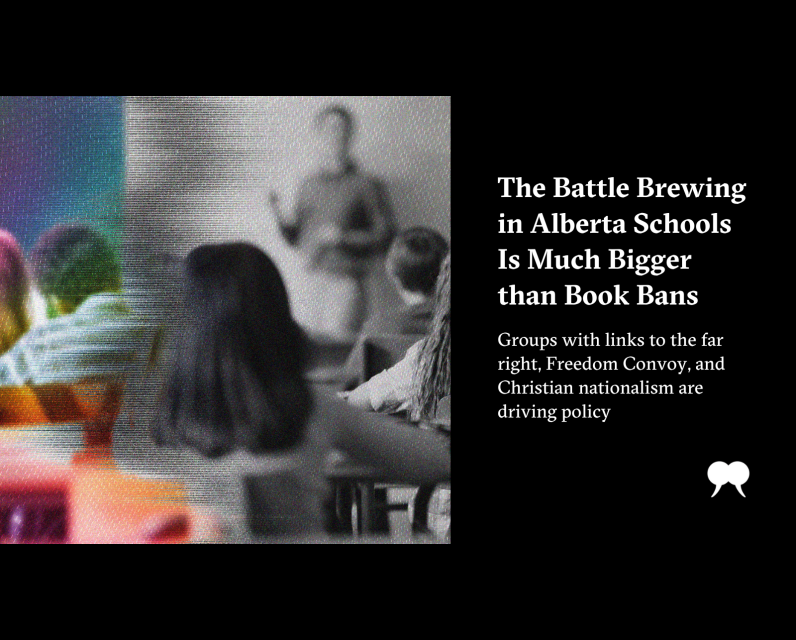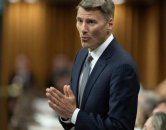The Battle Brewing in Alberta Schools Is Much Bigger than Book Bans

Over the past year, Premier Danielle Smith’s government has moved to introduce restrictions on what names and pronouns Alberta students can use at school, what they learn in sex ed, what sports teams they play on, and what books they can read. But the individuals and groups claiming victory for these policies and working to influence the province’s upcoming school board elections mostly aren’t parents concerned about their school-aged kids—they’re largely conservative activists with no direct ties to the school system.
A new report from the Parkland Institute, a non-partisan research organization based at the University of Alberta, shows how the province’s education system is at the centre of a growing political and ideological struggle over what kids are exposed to in schools—a struggle being dictated by groups like the Christian nationalist–affiliated Action4Canada and the far-right group Take Back Alberta. It’s an extension of a similar movement in the United States that’s seen waves of legislation also targeting children’s books and sports teams, as well as what bathrooms they can use—a movement embodied by the Project 2025 handbook influencing US president Donald Trump and his allies at the state level.
And while much attention has been paid to these policies’ direct negative impact on LGBTQ2S+ youth in Alberta, experts warn that these groups ultimately aim to influence other aspects of education. That not only includes this wave of anti-trans legislation, but a push toward social conservatism and school privatization across the education system.
“It’s not just about transgender people,” says Heather Ganshorn, the report’s author. “They want to take over politics. They want to take over education. They want to reclaim the family—it’s white Christian patriarchal supremacy. So that’s bad for everyone, except for the few alpha males who get to be at the top of it.”
Ganshorn is a librarian and a parent of two students in the Alberta public school system. She’s also the research director at Support Our Students Alberta, a grassroots organization that advocates for inclusive and equitable public education. In the Parkland report, she outlines key actors, including Action4Canada and Take Back Alberta, who’ve played a role in the push for so-called “parental rights” legislation in the province.
Most recently, this played out over school library requirements that were proposed in May. The province said it was planning to prohibit books that it deems inappropriate because of what it considers sexually explicit content. At the time, education minister Demetrios Nicolaides said these changes came as a result of conversations with concerned parents.
However, the Investigative Journalism Foundation (IJF) reported that a list of prospective books to ban—including the four graphic novels publicly mentioned by Alberta officials—was provided to government officials by at least two social conservative activist groups: Parents for Choice in Education (PCE) and Action4Canada. Of the four books flagged by government officials, three were specifically LGBTQ2S+ graphic novels aimed at young people. (After the policy was lambasted by the public, it was recently amended to only have “explicit visual depictions of a sexual act” banned from school library shelves. That means titles by Margaret Atwood and Maya Angelou will be safe, but graphic novel memoirs like Maia Kobabe’s Gender Queer and Alison Bechdel’s Fun Home will still be removed.)
Ganshorn says parents, educators, and Alberta in general should be concerned by the heavy involvement of these advocacy groups that have nothing to do with schools or kids in Alberta’s education policy. She points to the “parental rights”–focused PCE, whose executive director, John Hilton-O’Brien, doesn’t have kids himself.
“Why do they care so much about education?” Ganshorn asks. It’s not because of personal experience, she says; it’s because education is a tool of socialization.
Politicians on the right have said as much: in a 2016 interview with Rebel News’s Ezra Levant, then member of Parliament—and future United Conservative Alberta premier—Jason Kenney said that the school system “hard-wired . . . identity politics” into the minds of young Albertans, and it was on conservative politicians to “break that nut.”
In recent years, conservative groups have decided that instead of complaining about what kids learn in school, they would go straight to the source. Hilton-O’Brien was one of the founders and former president of Alberta’s Wildrose Party, which Smith led until 2014 when she and eight other members of the legislative assembly crossed the floor to join the then Progressive Conservative Party.
In a newsletter to supporters following the initial announcement of the book ban, PCE took credit for the policy getting introduced. And in messages to their supporters, Action4Canada thanked Nicolaides for meeting with their representatives last fall to spark the process of introducing an Alberta book ban.
Freedom of information requests filed by the IJF found that Alberta officials also used a list of books to target that originated from a website with ties to the US-based group Moms for Liberty, which has been designated as an extremist-affiliated group by the Southern Poverty Law Center, a civil rights organization. Moms for Liberty has been known to provide government officials with model legislation and lists of books or media to target across the United States.
This isn’t the first time a western Canadian premier has tried to attribute anti-LGBTQ2S+ policy to a groundswell of “concerned parents” when it was actually the work of a dedicated right-wing advocacy group. A similar situation unfolded in 2023 in Saskatchewan around the province’s school pronoun policy, which mandates that parents be informed if a young person wants to change the name or pronouns they go by at school—and also restricts sex-ed resources.
Premier Scott Moe claimed the policy came about after consultation with “concerned parents” in the province. But when asked by media how many parents had told him they were surprised to hear their child had changed their name and pronouns at school, Moe said he did not have an answer. He also admitted he hadn’t heard from anyone in his own constituency with those concerns.
Action4Canada also claimed victory for the Saskatchewan policy getting passed. The group’s founder, BC-based Tanya Gaw, claimed Action4Canada sent more than 10,000 emails to Moe and then education minister Dustin Duncan via an online petition, and said a group member met with a member of Duncan’s staff to serve a “notice of liability.” The not legally valid document—a tactic often used by groups to threaten or intimidate—alleged the government was liable for causing harm to children by exposing them to “sexually explicit” materials.
In a video celebrating the Saskatchewan policy, Gaw said: “There is no such thing as a trans child. I’m going to just keep repeating that and repeating that: there is no such thing as a trans child.”
Hazel Woodrow, the education program manager for the Canadian Anti-Hate Network, says that Action4Canada has deep ties to many hate-group-adjacent movements, including the Freedom Convoy, anti-vax campaigns, and anti-LGBTQ2S+ advocacy. Representatives from the group have sued the provincial government over vaccine mandates, protested drag queen story hours, and equated sex education resources, including those relating to consent, with child sex trafficking. Gaw has also said that she believes we’re in a so-called spiritual battle of good versus evil when it comes to sexual orientation and gender diversity guidelines in schools.
But for many ground-level members, their involvement with Action4Canada is simply resharing posts on social media or sending form letters to politicians. Woodrow likened groups like Action4Canada to a multi-level marketing scheme—but instead of hawking discount knives or sketchy smoothies, it’s misinformation and fear mongering about kids.
Woodrow also compared Action4Canada’s anti-LGBTQ2S+ advocacy to anti-abortion work done by groups like the Campaign Life Coalition in Ontario during the 2010s, particularly how these movements spread through social media misinformation and stoke moral panic around issues like abortion or trans rights.
“You follow Action4Canada on Facebook, and then you see what they’re posting about, and then you share that to your Facebook wall, and then your friends share it. And then suddenly you have thirty people in your town who are all up in arms about this thing,” she says. “So Action4Canada can create calls to action and, to an extent, direct people to do things. But also, it’s difficult to measure the impact of the way that these ideas get picked up once they hit social media, and it’s out of A4C or CLC’s hands.”
Woodrow says these groups empower people to raise concerns with government officials to get specific legislation or policies passed through fill-in-the-blank form letters and legal threats.
“They’ll produce form letters that you can sign and submit, and also [take] the approach of sending these notices of liability, which are not real but are intimidating and will basically say things like, ‘if you force or if you expose my child to X, Y and Z in the classroom, then you are liable for X, Y and Z,’ and it’s basically using legalese to intimidate people,” Woodrow says.
Ganshorn says the next steps for many of these groups in Alberta will come with the upcoming school board elections on October 20. Representatives from the UCP-aligned group Take Back Alberta have already said they’re providing training for prospective local school board candidates on anti-LGBTQ2S+ and anti–sexual orientation and gender identity messaging.
And while the talking points of Take Back Alberta and its leader David Parker might seem far-fetched, Ganshorn warns that their influence is already being felt in Alberta.
“People sort of go, ‘well, he’s on the fringe,’” she says. “But he took over the UCP. After we’ve seen what MAGA did and what they were able to do, to still be up here in Canada saying, ‘well, these people are just kooky.’ It really bugs me, because they’re a serious threat.”
This story was produced in collaboration with Xtra Magazine.
The post The Battle Brewing in Alberta Schools Is Much Bigger than Book Bans first appeared on The Walrus.



Comments
Be the first to comment